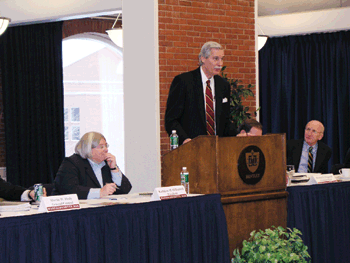 |
| Chief Justice for Administration and Management Robert A. Mulligan filled in the House of Delegates about the progess of changes in the court system. |
In its first meeting of 2005, the MBA's House of Delegates heard its annual report from the court's Chief Justice for Administration and Management, considered a request for an amicus brief in five cases before the Supreme Judicial Court, debated health and safety issues at the Middlesex County Courthouse in a lively and fast-paced
meeting.
In his annual review of the courts, CJAM Robert A. Mulligan updated members on the work to create a court-staffing model, discussed case-flow management, courthouse security, the MassCourts computer system and judicial evaluations.
Mulligan said the court staffing model is due to be released on Feb. 1. The issue, he said, has been "how to balance requests for staffing that are based on mismanagement and which are needed urgently to make a court operate successfully." He said that the consultant who was hired to develop the model, Chris Ryan, "encountered greater receptivity and better cooperation from Massachusetts court personnel than in any other state he has worked in." As a result, Mulligan said he was looking forward to having "empirical data for the first time to be able to address needs on the basis of objective criteria."
On the topic of courthouse security, Mulligan said funds from the state's $10.6 million supplemental budget allowed for the hiring of 135 court officers. "It's not as many as we need," he said, "but it's gone a long way to increase security in our courthouses."
Mulligan also announced that the MassCourts comprehensive, statewide case-management system is about to be activated, with the Land Court being the first court to go online by the end of January. "We are the first state in the nation to create an integrated system to tie together all the trial court departments," Mulligan said. He praised the work of chief information officer Craig Burlingame and Appeals Court Justice James F. McHugh is keeping the project on moving forward.
Turning to court facilities issues, Mulligan said the proposal from a year ago to create regional justice centers "is absolutely off the table these days." Likening the concept to "shopping malls," he noted, "I don't believe in that model. Courts should be on Main Streets, where people can get to them easily." Insisting also that it is his view that all related court departments should be in the same building, Mulligan said work is proceeding on plans for court buildings in Salem, Lowell and Taunton.
Referring to these projects as well as to health and safety concerns at the Middlesex County courthouse in Cambridge (see related article, page 1), Mulligan made a pitch for MBA support for court facilities funding.
"If this organization wants to do something to help the courts, it would be moving toward raising our bond cap to $150 million. Then we could move forward on more projects," he said. The courts are currently limited to $115 million annually for court building renovations. The additional funds would allow work to proceed more quickly on multiple buildings, Mulligan said.
Other HOD business
Other business before the HOD included:
• Following a lively "point-counterpoint" debate between Middlesex County District Attorney Martha Coakley and Criminal Justice Section Chair Edward P. Ryan, Jr., over the excited utterance exceptions to the hearsay rule in the U.S. Supreme Court decision in Crawford v. Washington, the HOD failed to approve a request to file an amicus brief in five cases currently before the Supreme Judicial Court.
• Ryan presented a preliminary report on eyewitness identification prepared by the Criminal Justice Section. The formal report and proposal will be presented at the March 3 meeting of the HOD.
• The HOD appointed a committee to study health and safety issues at the Middlesex County Courthouse in Cambridge (see related article, page 1).
• A slate of nominees for this year's Access to Justice Awards was approved (see related article, page 13).
• Judicial Evaluations Standing Committee Chair Edward W. McIntyre informed the delegates that the MBA's online judicial evaluations process has begun live testing (as www.massbar.org/jeval), with an official launch to be announced in the near future. The HOD also voted to allow the committee to provide evaluation results to individual judges at the same time it releases results to the court administration. This had not been provided for in the committee's initial authorization (see article, page 1).
• The HOD also voted to reaffirm its support of legislation establishing an Environmental Appeals Board within the Division of Administrative Appeals.
• During her remarks, MBA President Kathy O'Donnell announced the make-up of several committees:
- Executive Director Search Committee: MBA President Elect Warren Fitzgerald, chair; MBA past presidents Elaine Epstein and Paul Sugarman; MBA House of Delegates member Robert Lucas; and Margaret D. (MarDee) Xifaras, a past president of the Massachusetts Bar Foundation.
- Nominating Committee: Recent past presidents Carol DiMento, Joseph P.J. Vrabel and Richard C. Van Nostrand, as well as Marylin A. Beck, James Dilday, Marsha Kazarosian and Edwin Wallace.
- Election Committee: John Carroll, Denise Murphy and Lee Gartenberg.